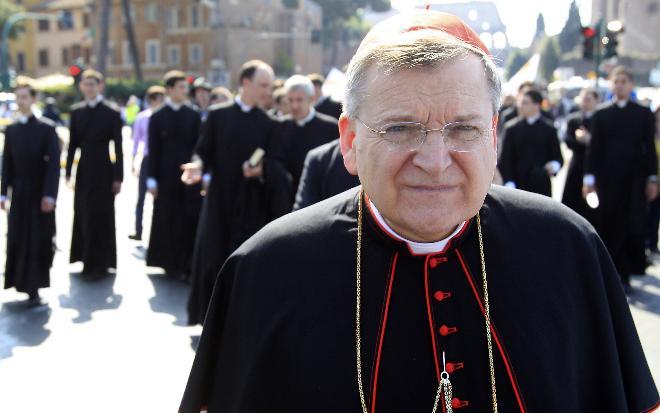Pope Francis Removes Former LA Crosse Bishop Raymond Burke
The Milwaukee Journal Sentinel
Pope Francis on Monday removed two American-born cardinals — including former La Crosse Bishop Raymond Burke — from the Vatican's Congregation for Bishops, meaning the ultraconservative prelate will lose his influential role in the appointment of bishops in the United States. Burke and retired Philadelphia Cardinal Justin Rigali were among more than a dozen members of the Vatican old guard who were removed from the 18-member congregation on Monday. Among those appointed was Washington, D.C., Cardinal Donald Wuerl. While conservative, Wuerl is seen as a bridge-builder and less dogmatic than Burke, who has promoted the denial of communion to pro-abortion rights Catholic politicians and in recent interviews appeared to question the new pope's plans to reshape the Vatican bureaucracy known as the curia. Monday's appointments are seen as the key to securing Francis' legacy. "He is saying that you don't need to be a conservative to become a bishop," said Alberto Melloni, the director of the John XXIII Foundation for Religious Studies in Bologna, Italy, a liberal Catholic research institute. "He wants good bishops, regardless of how conservative or liberal they are." Burke, a Wisconsin native popular with American conservatives, served as bishop of La Crosse from 1994 to 2003 and joined the Roman Curia in 2008. He serves as president of the Apostolic Signatura, the Vatican's highest court, and was appointed to the Congregation for Bishops by Pope Benedict XVI in 2009. Burke came to the Vatican after serving as archbishop of St. Louis. He is a favorite of many conservative Catholics in the United States for his upholding of church rites and traditions favored by Pope Benedict. Burke's preference for the long train of billowing red silk known as cappa magna, and other such vestments, has, however, made him seem out of step with Francis, who has made it clear through example that he prefers more humble attire. In a recent interview with EWTN, a U.S.-based Catholic cable network that spotlights conservative views, Burke questioned Francis' ability to reform the Vatican bureaucracy. "The service of the Roman Curia is part of the very nature of the church, and so that has to be respected," Burke said. "I can't imagine that somehow the Roman Curia is going to take on a completely different figure. It just doesn't make sense," Burke said. The interview was broadcast Thursday as the centerpiece of a program that highlighted concerns about the direction of the church since Francis was elected in March. Francis' own top collaborators, namely a "kitchen cabinet" of eight cardinals he tapped to help him change the Vatican's Byzantine and often scandal-ridden ways, have said that the old curial system "is over," as one put it, and will be replaced by "something different." In his EWTN interview, Burke reiterated his hard-line view on Communion, and he took pains to note that Francis' comments in his recent exhortation on the church, called "Evangelii Gaudium," were meant as "suggestions" and not as authoritative papal teaching. Burke also echoed conservative concerns over the pontiff's effort to strike a "new balance" so that church leaders do not "obsess" over a few teachings like abortion and gay marriage. Instead, Francis wants them to speak more about the need to care for the poor and marginalized. "One gets the impression, or it's interpreted this way in the media, that he thinks we're talking too much about abortion, too much about the integrity of marriage as between one man and one woman," Burke said. "But we can never talk enough about that!"
|
.
Any original material on these pages is copyright © BishopAccountability.org 2004. Reproduce freely with attribution.
